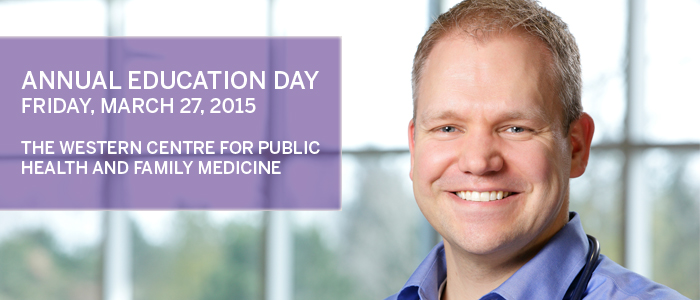Annual Education Day

The Department of Family Medicine invites faculty and staff to our annual Education Day on Friday, March 27, 2015 at The Western Centre for Public Health & Family Medicine.
Join us for a day of faculty development and informative workshops, as well as a plenery session, a networking luncheon and the Chair's wine and cheese reception.
View agenda.
Approved for up to 6.0 Mainpro M1 credit hours, based on 360 minutes of educational time.
Available workshops:
Workshop 1
Dr. Scott McKay
Integrating Apps and E-Resources into Clinical Teaching
Objectives: By the end of the workshop, participants will:
-
Be familiar with evidence based apps and e-resources for use within a clinical teaching environment
-
Be able to access and use some apps and e-resources intended for a clinical teaching environment (including drug guides, medical calculators, treatment guidelines, and more)
Note: This will be an interactive session and all participants are encouraged to bring their mobile device (phone, tablet, laptop, etc.)
Workshop 2
Drs. Jamie Wickett, Darren Van Dam & Michelle Levy
Orientation for New Faculty – Undergraduate and Postgraduate Perspective
Objectives: By the end of the workshop, participants will:
-
Be up-to-date with the Postgraduate Family Medicine curriculum
-
Be familiar with the resident assessment portfolio
-
Be familiar with important reasources and opportunities.
Workshop 3
Dr. Eric Wong
Feedback and Evaluation with attention to Field Notes
Objectives: By the end of the workshop, participants will be able to:
-
Describe the Accreditation Standards for resident assessment in family medicine
-
Describe the theoretical basis of field notes as an assessment tool
-
Describe how to effectively use field notes
-
Identify potential barriers and solutions to using field notes in your teaching practice
Workshop 4
Dr. Sonny Cejic and Ms. Kelsey Klages
Quality Improvement – A Teaching Tool and Way to Improve Your Practice
Objectives: By the end of the workshop, participants will:
-
Gain an understanding of the Model for improvement and communicate using key concepts
-
Become proficient in basic quality improvement tools in practice
-
Learn how to apply/reflect on own quality culture
-
Explore tools to become a quality improvement mentor to residents
Workshop 5
Dr. George Kim
Professionalism and Learners –Why, When and How
Objectives: By the end of the workshop, participants will be able to:
-
Outline a competency-based approach for nurturing and teaching professional behaviours for learners.
-
Describe methods for assessing professional behaviours and providing effective feedback.
-
Describe an approach for remediating lapses in professional behavior.
Workshop 6
Ted Osmun & Steven Wetmore
Disseminating your scholarly activity – what counts and how to do it
Objectives: By the end of the workshop, participants will be able to:
-
Describe what is meant by scholarly activity and what its value is going forward for promotion
-
A pragmatic approach to publications
-
Explore the why, when, where, what, who and how of getting published
-
Identify sources of funding for community physicians to do research
-
Identify other sources of support for research
-
Identify journals sympathetic to family medicine and when to choose them
-
Explore publication ideas with the participants








